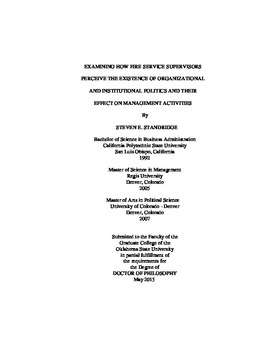| dc.contributor.advisor | Brown, Anthony | |
| dc.contributor.author | Standridge, Steven E. | |
| dc.date.accessioned | 2016-09-29T18:37:01Z | |
| dc.date.available | 2016-09-29T18:37:01Z | |
| dc.date.issued | 2015-05 | |
| dc.identifier.uri | https://hdl.handle.net/11244/45209 | |
| dc.description.abstract | This research examines how fire service supervisors, from the rank of lieutenant through fire chief, perceive the existence and impact of bureaucratic politics. For testing of the research hypothesis, bureaucratic politics is operationalized through the theoretic lenses of organizational and institutional politics. | |
| dc.description.abstract | Regression analysis indicates there are statistically significant negative linear relationships between perceptions of organizational politics (POP) and strategic planning, budgeting and building social capital. | |
| dc.description.abstract | Augmenting these findings, regression analysis suggests there are negative linear relationships between internal influencer groups (chief officers, rank and file personnel, and other internal stakeholders) and respondents' perceptions of institutional politics (PIP). That is, as respondents perceived each group's influence increasing, there was a corresponding decrease in POP scores. | |
| dc.description.abstract | Conversely, there was a statistically significant positive relationship between PIP and local elected officials. There was also a statistically marginal positive relationship between POP and business groups. That is, as respondents perceived these groups influence increasing, there was a corresponding increase in PIP scores. | |
| dc.description.abstract | Regression analysis also suggests that as the level of education increases or the higher the rank, there are corresponding decreases in respondents' POP scores. Likewise, as the population served increases, there is a corresponding increase in respondents' PIP scores. | |
| dc.description.abstract | The results of the statistical analysis, while not as definitive or supportive of some of the hypotheses advanced, did bring to light some interesting findings. | |
| dc.description.abstract | First, there is clearly support for the notion that employees at all levels perceive the existence of internal and external politics. | |
| dc.description.abstract | Second, respondents perceived that certain groups affect specific management activities. What is divergent between internal and external groups is that the former seemingly have a positive affect reducing POP, while the later increases PIP. | |
| dc.description.abstract | Finally, there is evidence to suggest demographic characteristics, both individually and organizationally, affect perceptions of one or both variants of bureaucratic politics. | |
| dc.format | application/pdf | |
| dc.language | en_US | |
| dc.rights | Copyright is held by the author who has granted the Oklahoma State University Library the non-exclusive right to share this material in its institutional repository. Contact Digital Library Services at lib-dls@okstate.edu or 405-744-9161 for the permission policy on the use, reproduction or distribution of this material. | |
| dc.title | Examining how fire service supervisors perceive the existence of organizational and institutional politics and their effect on management activities | |
| dc.contributor.committeeMember | Focht, Will | |
| dc.contributor.committeeMember | Mendez, Jeanette | |
| dc.contributor.committeeMember | Wang, Qingsheng | |
| osu.filename | Standridge_okstate_0664D_14054.pdf | |
| osu.accesstype | Open Access | |
| dc.type.genre | Dissertation | |
| dc.type.material | Text | |
| thesis.degree.discipline | Fire and Emergency Management | |
| thesis.degree.grantor | Oklahoma State University | |
